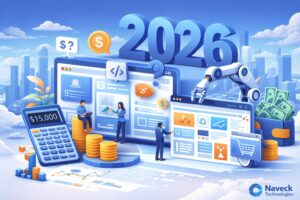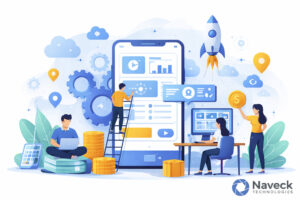The integration of Artificial Intelligence (AI) into software development is transforming how companies design, build, and deploy applications. From automating routine coding tasks to enhancing decision-making through predictive analytics, AI is redefining the entire software engineering process.
For forward-thinking organisations like Naveck Technologies, which specialises in custom software and AI-driven solutions, embracing these innovations is not just a trend — it’s a strategic advantage. Whether it’s leveraging machine learning for smarter automation or using AI tools to accelerate development lifecycles, understanding both the opportunities and challenges of AI is essential to stay competitive in today’s fast-evolving digital market.
In this article, we’ll dive deep into how AI is revolutionising software development, uncover key opportunities and potential hurdles, and share practical insights to help developers and businesses harness AI effectively. Throughout this post, we’ll also link to relevant Naveck blog resources and service pages, ensuring readers gain actionable knowledge to drive innovation and growth through AI.
The Role of AI in Software Development
Artificial Intelligence has moved beyond being just a buzzword; it’s now a practical tool that enhances productivity, accuracy, and efficiency in software development processes. For an AI developer, leveraging AI tools means automating mundane coding tasks, improving code quality, and even predicting potential bugs before they occur. Here are some ways AI is making waves in the industry:
1. Automated Code Generation
Tools like GitHub Copilot use AI to suggest code snippets and complete functions based on natural language prompts. This saves time and reduces human error. Developers no longer need to spend hours writing boilerplate code or searching for syntax references—AI does the heavy lifting for them.
2. Bug Detection and Testing
AI-powered testing frameworks can identify vulnerabilities faster than traditional methods, ensuring higher-quality software releases. These systems analyze patterns in codebases to detect anomalies and flag issues that might otherwise go unnoticed until later stages of development. For instance, machine learning algorithms can predict where bugs are most likely to occur based on historical data.
3. Predictive Analytics
AI models analyze historical data to predict project timelines, resource allocation needs, and potential roadblocks. This capability allows software development teams to plan more effectively and avoid costly delays. Predictive analytics also helps in identifying trends in user behavior, enabling developers to prioritize features that align with customer expectations.
4. Enhanced User Experience (UX)
By analyzing user behavior, AI helps create personalized experiences that meet customer expectations more effectively. For example, recommendation engines powered by AI can suggest products or content tailored to individual preferences, significantly boosting engagement and satisfaction.
For a deeper dive into these trends, check out our blog post on the best AI Business Ideas for Your Startup in 2025
Key Opportunities of AI in Software Development
1. Accelerated Development Cycles
AI accelerates software development by automating routine tasks such as debugging, testing, and deployment. This allows developers to focus on high-value activities like designing innovative features and optimizing performance. At Naveck, we leverage AI-driven DevOps pipelines to streamline workflows and deliver projects faster—learn more about our approach.
Automation isn’t limited to coding alone. AI tools can generate documentation, manage version control, and even assist in project management by tracking progress against predefined milestones. By reducing manual intervention, AI enables teams to work more efficiently and meet tight deadlines without compromising quality.
2. Improved Decision-Making
AI provides data-driven insights that guide strategic decisions throughout the development lifecycle. For example, predictive analytics can help a software development company allocate resources efficiently or prioritize feature updates based on user feedback. Explore how we implement AI-powered analytics in our consulting services.
These insights aren’t just useful for technical teams—they also empower business leaders to make informed choices about product strategy, marketing campaigns, and customer support initiatives. With AI, organizations gain a holistic view of their operations, allowing them to act proactively rather than reactively.
3. Enhanced Security Measures
Cybersecurity threats are evolving rapidly, but so are AI capabilities. Machine learning algorithms can detect anomalies in real-time, preventing breaches before they happen. As part of our commitment to security, Naveck integrates AI-based threat detection systems into all our software solutions. Read more about our cybersecurity offerings.
AI doesn’t just stop at detection—it can also respond autonomously to certain types of attacks. For example, AI-powered firewalls can block malicious traffic instantly, reducing the risk of data loss or downtime. This level of responsiveness is critical in today’s fast-paced digital environment.
4. Cost Efficiency
By reducing manual effort and minimizing errors, AI lowers operational costs significantly. A software development company adopting AI tools can achieve better ROI while maintaining high standards of quality. Automation reduces the need for large teams, freeing up budget for innovation and experimentation.
Additionally, AI can optimize cloud infrastructure usage, ensuring that resources are allocated dynamically based on demand. This not only cuts down on unnecessary expenses but also improves scalability and performance.
Challenges of Implementing AI in Software Development
While the benefits of AI are undeniable, there are several hurdles that both software development companies and AI developers must overcome:
1. Skill Gaps and Training Needs
AI requires specialized knowledge, which many traditional developers may lack. Bridging this skill gap often involves extensive training programs or hiring dedicated AI experts. To address this challenge, Naveck offers tailored upskilling workshops for teams looking to adopt AI technologies. Learn more about our training programs.
Training isn’t just about teaching developers how to use specific tools—it’s about fostering a culture of continuous learning. As AI evolves, staying updated with the latest advancements becomes essential for long-term success.
2. Data Privacy Concerns
AI relies heavily on data, raising concerns about privacy and compliance with regulations like GDPR. Ensuring ethical use of data is paramount for any AI development company. Our team adheres to strict data governance policies, ensuring transparency and accountability. Discover how we handle data responsibly.
Data privacy isn’t just a legal obligation—it’s also a trust-building measure. Customers are more likely to engage with brands that demonstrate a commitment to protecting their information. By implementing robust privacy protocols, companies can enhance their reputation and foster loyalty.
3. Integration Complexity
Integrating AI into existing systems can be complex and costly. Legacy systems may not support modern AI frameworks, requiring significant overhauls. At Naveck, we specialize in seamless integrations that minimize disruption—explore our system integration services.
Successful integration requires careful planning and collaboration between IT teams, stakeholders, and external partners. It’s important to assess compatibility, define clear objectives, and establish metrics for measuring success.
4. Bias and Ethical Issues
AI models trained on biased datasets can perpetuate inequalities. Mitigating bias demands careful planning and continuous monitoring. We emphasize ethical AI practices across all our projects, ensuring fairness and inclusivity. Dive deeper into our ethical AI initiatives.
Ethical considerations extend beyond bias—they include transparency, accountability, and explainability. Users should understand how AI-driven decisions are made and have the option to contest them if necessary. Building trust through ethical practices is key to unlocking AI’s full potential.
The Future of AI in Software Development
As AI continues to evolve, its role in software development will only grow stronger. Innovations such as generative AI, reinforcement learning, and edge computing promise to unlock new possibilities for developers and businesses alike. However, success will depend on striking the right balance between embracing technology and addressing its limitations.
Generative AI, for instance, is already transforming creative industries by producing art, music, and written content. In software development, it could lead to fully autonomous programming assistants capable of building entire applications from scratch. Reinforcement learning, meanwhile, holds promise for optimizing complex systems like supply chains or logistics networks.
Edge computing brings AI closer to users by processing data locally instead of relying on centralized servers. This approach reduces latency and enhances privacy, making it ideal for IoT devices and mobile applications.
For a software development company or an AI development company, partnering with experts who understand the nuances of AI implementation is essential. At Naveck, we combine technical expertise with a forward-thinking mindset to deliver transformative solutions. Whether you’re looking to integrate AI into your existing systems or develop custom AI-powered applications, our team is here to help. Explore our full range of services here .
Conclusion
AI presents immense opportunities for innovation in software development, from automating mundane tasks to enhancing security and personalization. However, it also poses unique challenges that require careful consideration and strategic planning. By staying informed about the latest trends and best practices, software development companies and AI developers can harness the power of AI to drive growth and success.
Ready to take your software development journey to the next level? Connect with us today to learn how Naveck can empower your business with cutting-edge AI solutions. Visit our contact page to get started!



